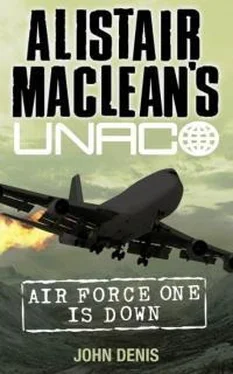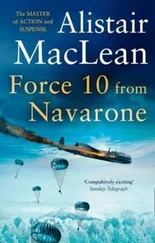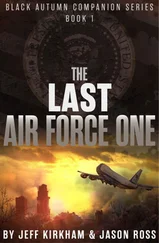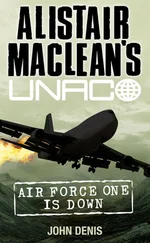‘You,’ the man said in guttural English, ‘the girl. You. Up.’
Sabrina straightened and swivelled on her knees to look into the barrel of his gun and seven others. A silent ring of men, wet-suited and anonymous, made it abundantly clear that if she fought them, she would die.
She climbed to her feet and tossed the machine-pistol into a bush.
‘Good,’ said the man, and turned to Smith. ‘You – into the boat.’
‘My friend,’ Smith cried. ‘I don’t know who you are, but you’ve come at the right moment. I want to–’
He reeled back as the leader of the group cuffed him sharply on the mouth. Blood dribbled from his split lip, and Smith’s eyes grew large and frightened.
‘Into the boat. No time for talk.’
Smith recovered some of his composure.
‘Of course, of course,’ he soothed. ‘I take your point utterly.’ He bent triumphantly to Sabrina. ‘Well, my sweet,’ he crowed, ‘it appears that, after all, you have lost and I have won. It’s a great pity you did not accept my offer. It is, of course, unrepeatable.’
‘I’ll live with the disappointment,’ Sabrina said drily, although she was inwardly boiling with rage and frustration. How could she have been so dumb as to mistake the noise of the launch for McCafferty’s helicopter? And where the hell was Mac, anyway?
Smith bowed – then his eyes flashed again as two men roughly seized his arms and propelled him towards the boat. He protested loudly, but they picked him up and dumped him over the side, still clutching the ransom bag.
The launch revved, the sea churned in its wake, and the wind rose, and above the noise Sabrina could hear Smith’s voice, screaming, pleading, commanding.
As the boat pulled away from the shore with its passenger and wordless sentinels, a dark object flew through the air in a graceful arc and landed at her feet.
She picked it up by the metal ring and opened the chamois leather bag.
Fifty million dollars in cut diamonds glinted warmly in her eyes.
Philpott had fashioned himself a rude crutch and was now stoking his fire more for the comfort it provided against the chill night air than for its value as a beacon. He was engrossed in the task, but his keen ears caught the soft footfall behind him. His senses flared and he looked for the gun McCafferty had left him. It was lying by the fire, after he had used it as a poker.
‘You won’t need the weapon, Mr Philpott,’ came Myshkin’s soft, sinister voice. ‘I am sorry to see that you are hurt. It is, I trust, nothing serious.’
Philpott turned to greet his visitor, the flames dancing merrily behind his head.
‘Not too serious, General,’ he replied. ‘To what do I owe the pleasure of your company?’
Myshkin’s lips tightened into a smile.
‘Merely that I wished to offer you my congratulations, Mr Philpott. You have won at least half of your battle.’
‘Won? What are you talking about?’ Philpott gabbled.
Myshkin’s mouth actually relaxed.
‘You will soon learn everything, I am sure. Suffice it for the moment to say that your charming agent Miss Carver is in possession of the ransom money. Intact. No deductions for expenses.’
Philpott gaped at him.
‘And Smith?’
Myshkin shrugged and spread his hands apologetically.
‘There, I’m afraid, is the half of the battle you lost. Mister Smith has been, shall we say, removed from the scene for a while. If he had been captured by your forces, you would have put him back into prison, and that, my dear Philpott, would have been a criminal waste of an extraordinary criminal mind.’
Philpott let out a cynical chuckle.
‘You mean you have him, General, and of course you want to make sure he keeps quiet about your own questionable role in this affair.’
Myshkin shrugged again, and observed that Smith would probably keep a low profile for an acceptably long period of time. ‘Then – who knows?’
‘Who indeed?’ Philpott retorted. ‘And when, pray, did all these miracles happen, Myshkin?’
The KGB man studied his watch and said, ‘I think you will find my intelligence is accurate, Mr Philpott.’
Philpott inclined his head.
‘It’s good to see you acting in the capacity of a loyal and upright UNACO member state, General.’
Myshkin loosed an oily grin again.
‘I thought you’d take that view, Mr Philpott. May I offer you a cigar?’
‘You may.’
Myshkin produced a handsome leather cigar case inscribed, in ornate gold letters, ‘With affection and respect: Warren G. Wheeler.’ Philpott accepted a Havana-Havana and a light, and drew the smoke gratefully into his lungs.
‘Isn’t that your transport?’ Myshkin asked suddenly, pointing at the skyline.
Philpott peered after his finger, and picked out the winking lights of a helicopter.
‘It is,’ he confirmed, ‘and Mac’s guiding one of our launches in so that I can get a more comfortable ride.’
He turned back and began, ‘Well, I must say, General, I’m greatly impressed–’
But he stopped in mid-sentence, for Myshkin had melted away into the night …
Philpott sat at a table in Air Force One, supporting his sprained ankle on a cushioned seat. He glowed expansively as Dr Hamady said, ‘Naturally, I can only speak for the sovereign state of Saudi Arabia, but I think it likely; if only as a tribute to our departed and lamented colleague, Hawley Hemmingsway, that we shall consider the oil accord to bear every chance of success. What do you say, Your Excellency?’ he asked of Sheikh Arbeid.
The Iraqi grunted agreement. The Libyan, Sheikh Dorani, followed suit. The Bahraini, Sheikh Zeidan, smiled gravely, and Feisal nodded enthusiastically.
‘I am sure the American Government will be most grateful to you, gentlemen,’ Philpott beamed.
‘They should be grateful to you , and of course to UNACO and its agents,’ Zeidan put in. ‘Without you we should not have been saved, and neither would the ransom, although that is of small consequence.’
‘Oh, quite,’ said Philpott.
Zeidan leaned forward and whispered into Philpott’s ear, ‘Ought our gratitude not to be extended in perhaps another direction, too?’
‘What do you mean?’ Philpott whispered back.
Zeidan smiled knowingly. ‘Do not imagine for a moment,’ he continued, ‘that I, for one, believe Mister Smith could have mounted an operation on that scale without benevolent assistance, shall we say. His very presence in Yugoslavia, his access to men, armaments, machines, would have been impossible unless …’
‘Unless?’
‘Unless he had the help of – a big brother? A big red brother? In any case, where is Smith? You don’t have him? Shall we ever see him again, Mr Philpott?’
‘I suspect, Your Excellency,’ Philpott replied glumly, ‘that we shall.’ And he gave Sheikh Zeidan a broad wink.
Sabrina Carver arrived at the table with a teapotful of Scotch and the promise of an interesting night ahead with Joe McCafferty in Geneva.
‘Now then, Your Excellency,’ she said to Sheikh Arbeid, ‘was that tea with milk and sugar, or coffee with cream and no sugar, or tea with cream and–’
Chief Steward Master Sergeant Pete Wynanski groaned on the sidelines.
‘That dame,’ he confided to McCafferty, ‘will never be anything but useless.’
Alistair MacLean’s
Air Force One Is Down
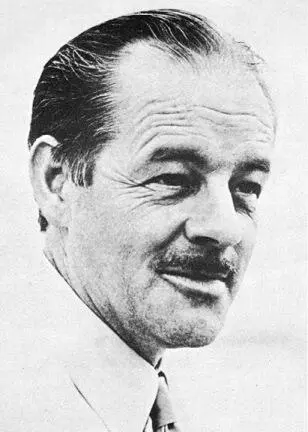
Alistair MacLean, who died on 2 February 1987, was the international bestselling author of thirty books, including world-famous novels such as The Guns of Navarone and Where Eagles Dare . In 1977 he was commissioned by an American film company to write a number of story outlines that could be adapted into a series of movies; two, Hostage Tower and Air Force One Is Down , were, with Alistair MacLean’s approval, published as novels by John Denis; these were followed by six by Alastair MacNeill, the highly successful Death Train , Night Watch , Red Alert , Time of the Assassins , Dead Halt and Code Breaker , and two, Borrowed Time and Prime Target by Hugh Miller.
Читать дальше
Конец ознакомительного отрывка
Купить книгу
